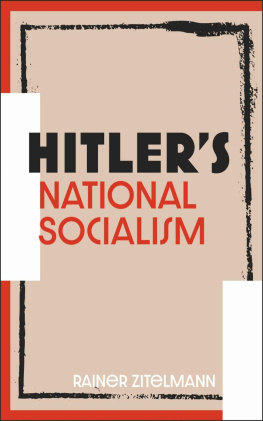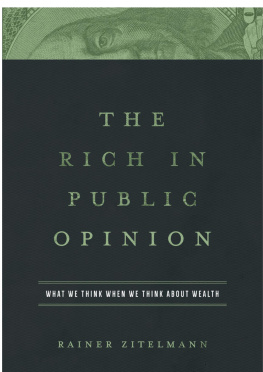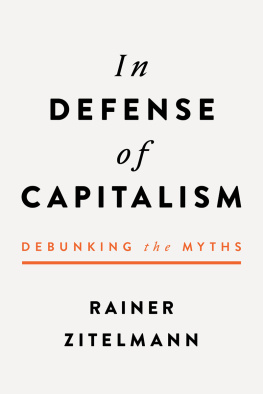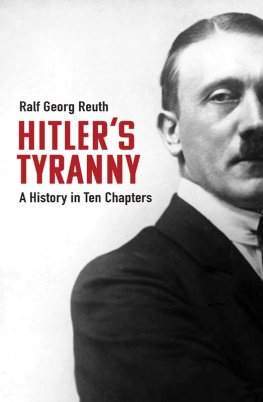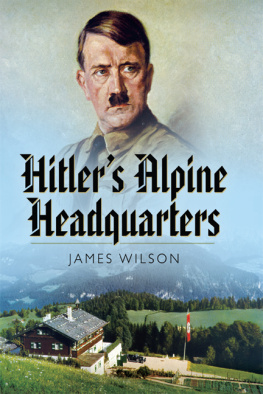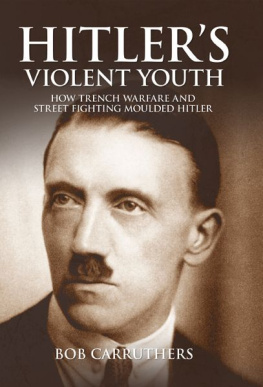Rainer Zitelmann
Hitlers National Socialism
Rainer Zitelmann
Hitlers
National Socialism
Copyright Dr. Rainer Zitelmann 2022
All rights reserved. No part of this publication may be reproduced, stored in a retrieval system, or transmitted in any form or by any means, electronic, mechanical, photocopying, recording, or otherwise without the prior permission of the publishers.
First published in German by Berg Publishers Ltd in 1987 under the title Hitler. Selbstverstndniseines Revolutionrs and subsequently published in several new editions in
German.
This new English language edition first published in 2022 by Management Books 2000 Ltd
36 Western Road
Oxford OX1 4LG
Tel: 0044 (0) 1865 600738
Email: info@mb2000.com
Web:
This new English edition is based on the 4th expanded German edition, which was published in 1998 by Herbig Verlagsbuchhandlung and in English as Hitler. The Policies of Seduction by London House in 1999.
The new essay On the Recent Historiography of Hitler and National Socialism (19962020) is largely based on an essay published in 2017 in the 5th expanded new editionof Hitler. Selbstverstndnis eines Revolutionrs , which was published by Lau-Verlag.
Translator of the essay: Sebastian Taylor, capitallanguagesolutions.com
Translator of the main body of the book: Helmut Bogler
Copy editing: Anja Hilgarth, Herzogenaurach
Cover: Matthew Renaudin
Author photo: Dr. Rainer Zitelmann
Composition and layout: ZeroSoft, Timisoara
This English language edition is published by arrangement with Maria Pinto-Peuckmann, Literary Agency, World Copyright Promotion, 7 Kaufering, Germany and Co-Agent Martha Halford-Fumagalli, Martha Halford PR.
This book is sold subject to the condition that it shall not, by way of trade or otherwise, be lent, resold, hired out, or otherwise circulated without the publishers prior consent in any form of binding or cover other than that in which it is published and without a similar condition including this condition being imposed upon the subsequent purchaser.
British Library Cataloguing in Publication Data is available
ISBN 9781852515997
The present study was accepted as a dissertation with summa cum laude in the winter term 1985/86 by the social and historical sciences faculty of the Darmstadt Technical University.
The supervisor of this dissertation was Professor Dr K. O. von Aretin.
Contents
by Karl Otmar von Aretin
b. The Problem of Compatibility between Revolutionary Claim
and the Tactics of Legality
III. Hitlers Social Objectives and His Assessment of the Major Classes of
Modern Society
IV. Hitlers Central Objective : The Revolutionizing of Politics and
Economics and the Restructuring of the Economic System
V. Hitler: An Opponent of Modern Industrial Society? Modernistic and
Anti-Modernistic Elements in Hitlers Weltanschauung
The Theory of Shrinking Markets as an Argument against the
Strategy of Economic Expansion
Contents
On the Recent Historiography of Hitler and National Socialism (19962020)
This is not a biography of Hitler, it is a study of his objectives and worldview, especially in the fields of social, economic and domestic policy. What was Hitlers thinking on the economy? What was his view of modern industrial society? What did he think about capitalism and socialism, about market and planned economics, about private property and nationalization? What were his views on the social strata within German society the workers, bourgeoisie, middle class and farmers? What were his sociopolitical ideas? What precisely did he mean when he used the term Volksgemeinschaft ? And how did he position himself within the political spectrum: what were his thoughts on social democracy, communism and fascism?
Since the original publication of this work, no other book has dealt with these topics. Over the intervening three decades, however, there has been a flood of books and essays on the subjects of Hitler and National Socialism. Any attempt to pay tribute to this wealth of research and to comment on every single facet of the research debate would, of course, extend far beyond the scope of this preface. Nevertheless, I would like to use the following pages to consider a number of the more recent works on National Socialism and Hitlers biography, especially where their findings relate directly to the essential questions that guide this book.
Readers who are not quite so interested in an exploration of recent research should feel free to skip past this preface and begin on page 69. This study was originally written in 1985/86 as a dissertation under the mentorship of Professor Karl Otmar Freiherr von Aretin at the Technical University of Darmstadt. Over the years, several German editions of this book have been published under the title Hitler: Selbstverstndnis eines Revolutionrs . In English, the book was published as Hitler: The Policies of Seduction a title which, unfortunately, does not accurately communicate the focus of my research, which is why it has been changed for this new edition.
My work was the first book to analyse and reconstruct Hitlers social, economic and domestic objectives on the basis of a comprehensive range of primary sources. At the same time, it was intended to provide valuable insights into the attractiveness and mass appeal of National Socialism by focusing more on the social-revolutionary motives that underpinned Hitlers Weltanschauung than the previous research had done. When the book was first published in 1987, it met with an overwhelmingly positive response from researchers around the world. Now, following a thorough review of the recent historiography, I can say with all certainty: my findings remain just as valid today as they were 30 years ago and the relevance of the questions I raised is confirmed by a number of far more recent research.
The starting point for my analysis was my thesis that the research had mistakenly claimed that Hitlers worldview was founded on just two components anti-Semitism and the question of capturing Lebensraum in the East and that these could not explain the allure and mass appeal of National Socialism, especially as neither figured prominently in any of the speeches Hitler gave between 1929 and 1932. In my opinion, even attempts to explain the success of National Socialism by focusing on irrational components failed to convince. At the same time, I highlighted the socialist and revolutionary objectives that underpinned Hitlers system of thought and the promise of social advancement as essential elements in the attraction exerted on the German population by National Socialism.
William Brustein draws very similar conclusions admittedly from a different perspective in his 1996 book, The Logic of Evil: The Social Origins of the Nazi Party, 19251933 . My central thesis, writes Brustein, is that the mass of Nazi followers were motivated chiefly by commonplace and rational factors namely, their material interests rather than by Hitlers irrational appeal or charisma. In complete agreement with my own earlier findings, Brustein concludes that anti-Semitism played a subordinate role in the rise of the NSDAP between 1929 and 1933.
Having evaluated comprehensive datasets compiled together with Jrgen W. Falter, Brustein determined that 40 percent of new NSDAP members between 1925 and 1933 were blue-collar workers. In his earlier research, Jrgen W. Falter had proved that the NSDAP had a larger proportion of working-class voters than had previously been assumed. Brusteins extensive research now proved that, in terms of its social composition, the NSDAP had a disproportionately high number of well-educated working-class members and a disproportionately low number of less-educated working-class members. And it was precisely for these working-class groups that Hitlers promise of social advancement a promise that plays a major role in this book was particularly attractive: The desire for economic advancement and the perception that the NSDAP, alone among the working-class parties, responded to that desire, made the NSDAP a likely choice for millions of German workers.
Next page
